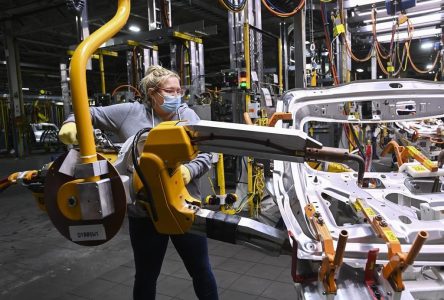TORONTO — Urgency was the key word at an electric vehicle conference Wednesday as manufacturers emphasized the need for more coordination and government support in order to take advantage of the tectonic shift underfoot in the automotive industry.
“The sense of urgency really can’t be overstated here,” said GM Canada president Marissa West at the inaugural EV Innovation & Technology conference at Humber College in Toronto.
“We need to move fast or this opportunity will slip away.”
The pressure for Canada to move quickly on electric vehicles, already growing because of climate change concerns and widespread supply chain shifts, has ramped up since the U.S. passed its Inflation Reduction Act (IRA), which provides huge subsidies for domestic EV manufacturing and sales, with money already flowing out the door.
The act also extends incentives to vehicles produced in Canada, but leaves a gap here on funding for new manufacturing facilities that will require Canadian government funding to help balance the playing field, said West.
“We’re not going to be able to beat the IRA in terms of amount of money, but we need to match some aspects, so that we can encourage the investment to happen in Canada where it makes sense.”
Canada has a significant advantage thanks to renewable energy supplies, said West, but the speed of project approvals as well as inconsistent policies between the provincial and federal governments are barriers to getting projects going.
For government to properly seize the moment, there needs to be a clear industrial policy in place, said Unifor President Lana Payne, both to attract investment and to ensure good jobs come out of the transition, since the shift puts about a third of auto manufacturing jobs at risk.
“We are in a unique moment where the world is looking at supply chains in a different way,” said Payne.
“Trying to localize more of that supply chain base is critical and that’s how we’ll get the jobs of the future.”
Canada has already attracted significant commitments on the electric vehicle front, with more than $15 billion committed since the start of 2021, but given the scale of the transition underway, industry executives said incentives are needed to secure more funding.
Linamar Corp. chief executive Linda Hasenfratz said half the company’s contract wins last year were for EV-linked products, triple the year before.
“Every vehicle is being rethought, not just in terms of design, but in terms of supply chain,” said Hasenfratz. “We’re really seeing momentum building in terms of new opportunities on electrified vehicles.”
She said the U.S. is facing a much more acute labour shortage than Canada, providing opportunities to secure more investments domestically, though she said Canada should also reconsider its immigration policies to let in more people who can be trained to work in manufacturing.
“Not everybody has to have post-secondary education. We can give them the skills that we need them to have on the shop floor,” said Hasenfratz.
The investments are needed not only on the manufacturing side, but also for the supplies of raw materials, battery recycling, software and research as the entire industry shifts, panellists said at the conference.
Such widespread shifts require more coordination, including on such issues as charging infrastructure, said GM president West.
“The charging infrastructure is one that keeps me up at night, because we’re not where we need to be, and it’s not something General Motors or any of the other vehicle manufacturers can do on their own,” she said.
The industry is in the midst of a huge transformation in the move toward decarbonization, which will crush many suppliers which will have to either fold or consolidate, said Rob Wildeboer, executive chairman of Martinrea International.
He said it’s crucial that the industry focus on innovation and stay nimble as the transition accelerates.
“The industry has changed more in the last five years, and will in the next five years, than it has in the last fifty.”
This report by The Canadian Press was first published Feb. 8, 2023.
Companies in this story: (TSX:LNR; TSX:MRE)




